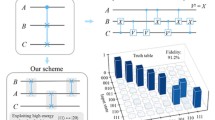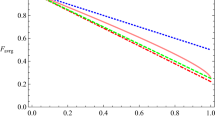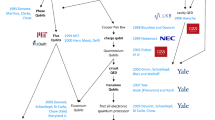Abstract
So far, the world of quantum-gated computing has been exploited, aimed at the limited applications based upon the Deutsch algorithm in 1985 and a few algorithms after his. However, the most important is to manage quantum-gated computers like we have designed and operated electronic computers. Fortunately, some theoretically novel challenge has been shown by the authors here. It happens that this challenge is too theoretical to be understood, but is very much needed in storing logical functions in a boolean algebra for the purpose of constructing hardware of quantum-gated computers and designing the programs. With storing data, the memory function is the basis of constructing quantum-gated computers. Toward practically simple construction of the quantum-gated computer, an example of simple memory, called registers, whose physical access is much easier is shown using the Bernstein-Vazirani algorithm.
Similar content being viewed by others
References
Rennie, R. (ed.): Oxford Dictionary of Physics, 7th edn. Oxford University Press, Oxford (2015)
Deutsch, D., theory, Quantum: The Church-Turing principle and the universal quantum computer. Proc. R. Soc. Lond. A 400, 97 (1985). https://doi.org/10.1098/rspa.1985.0070
Deutsch, D., Jozsa, R.: Rapid solution of problems by quantum computation. Proc. R. Soc. Lond. A 439, 553 (1992). https://doi.org/10.1098/rspa.1992.0167
Cleve, R., Ekert, A., Macchiavello, C., Mosca, M.: Quantum algorithms revisited. Proc. R. Soc. Lond. A 454, 339 (1998). https://doi.org/10.1098/rspa.1998.0164
Bernstein, E., Vazirani, U.: Quantum complexity theory. In: Proceedings of 25th Annual ACM Symposium on Theory of Computing (STOC ’93), pp. 11 (1993)
Bernstein, E., Vazirani, U.: Quantum complexity theory. SIAM J. Comput. 26, 1411 (1997). https://doi.org/10.1137/S0097539796300921
Simon, D.R.: On the power of quantum computation. In: Proceedings of 35th IEEE Annual Symposium on Foundations of Computer Science, pp. 116. https://doi.org/10.1109/SFCS.1994.365701 (1994)
Shor, P.W.: Algorithms for quantum computation: discrete logarithms and factoring. In: Proceedings of 35th IEEE Annual Symposium on Foundations of Computer Science, pp. 124. https://doi.org/10.1109/SFCS.1994.365700 (1994)
Grover, L.K.: A fast quantum mechanical algorithm for database search. In: Proceedings of 28th Annual ACM Symposium on Theory of Computing, pp. 212. https://doi.org/10.1145/237814.237866 (1996)
Mehendale, D.P., Joag, P.S.: A simple algorithm for complete factorization of an N-Partite pure quantum state. Quantum Phys. Lett. 6(1), 73 (2017). https://doi.org/10.18576/qpl/060110
Fujikawa, K., Oh, C.H., Umetsu, K.: A classical limit of Grover’s algorithm induced by dephasing: Coherence versus entanglement. Mod. Phys. Lett. A 34(07n08), 1950146 (2019). https://doi.org/10.1142/S0217732319501463
Yin, A., He, K., Fan, P.: Quantum dialogue protocol based on Grover’s search algorithms. Mod. Phys. Lett. A 34(21), 1950169 (2019). https://doi.org/10.1142/S0217732319501694
Nagata, K., Nakamura, T.: Some theoretically organized algorithm for quantum computers. Int. J. Theor. Phys. 59, 611 (2020). https://doi.org/10.1007/s10773-019-04354-7
Nakamura, T., Nagata, K.: Physics’ evolution toward computing. Int. J. Theor. Phys. 60, 70 (2021). https://doi.org/10.1007/s10773-020-04661-4
Gilbert, W.J., Nicholson, W.K.: Modern Algebra with Applications, 2nd edn. Wiley, Hoboken (2004)
Londero, P., Dorrer, C., Anderson, M., Wallentowitz, S., Banaszek, K., Walmsley, I.A.: Efficient optical implementation of the Bernstein-Vazirani algorithm. Phys. Rev. A 69(R), 010302 (2004). https://doi.org/10.1103/PhysRevA.69.010302
Nagata, K., Nakamura, T.: Quantum cryptography, quantum communication, and quantum computer in a noisy environment. Int. J. Theor. Phys. 56, 2086 (2017). https://doi.org/10.1007/s10773-017-3352-4
Acknowledgments
We thank Professor Soliman Abdalla, Professor Jaewook Ahn, Professor Josep Batle, Professor Do Ngoc Diep, Professor Mark Behzad Doost, Professor Ahmed Farouk, Professor Han Geurdes, Professor Shahrokh Heidari, Professor Wenliang Jin, Professor Hamed Daei Kasmaei, Professor Janusz Milek, Professor Mosayeb Naseri, Professor Santanu Kumar Patro, Professor Germano Resconi, and Professor Renata Wong for valuable comments.
Author information
Authors and Affiliations
Corresponding author
Ethics declarations
Conflict of Interests
On behalf of all authors, the corresponding author states that there is no conflict of interest.
Additional information
Publisher’s Note
Springer Nature remains neutral with regard to jurisdictional claims in published maps and institutional affiliations.
Rights and permissions
About this article
Cite this article
Nagata, K., Nakamura, T. A Quantum Algorithm for a FULL Adder Operation Based on Registers of the CPU in a Quantum-gated Computer. Int J Theor Phys 60, 2986–2994 (2021). https://doi.org/10.1007/s10773-021-04894-x
Received:
Accepted:
Published:
Issue Date:
DOI: https://doi.org/10.1007/s10773-021-04894-x




